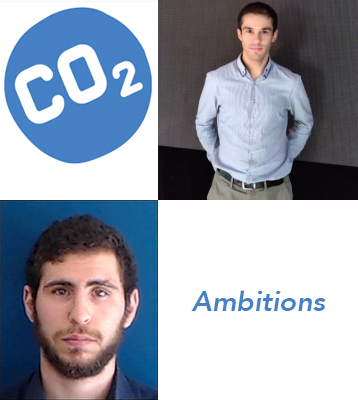Interview with Liyas Otsmane and Yani Meziane, apprentices on the Petroleum Engineering & Project Development and Petroleum Geosciences programs, and originators of the initiative.

A new student association —CO2 Ambitions—has just been set up, with the will to raise the awareness in IFP School students of the problems related to CO2. Its founders tell us more about it.
1. What is "CO2 Ambitions"?
Liyas: On arriving at IFP School, we both became aware that the problems related to CO2 are becoming increasingly significant in industry and that we will have to take them into account in our respective fields. This will apply to all the future professionals who graduate from the School.
Yani: Our idea was to found this association on the "student chapter" model in order to promote exchange of knowledge about the energy transition. Currently, our association has brought together about ten students from the various programs of IFP School.
2. Why did you decide to set up this new association?
Yani: The objective of this association is to really think about the energy transition. Our ambition is to contribute to disseminating knowledge about the energy transition. We hope that IFP School students can acquire knowledge that they will use subsequently in their careers. The idea is not to wait until we are faced with the problems before we start thinking about them and finding solutions!
Liyas: We would like to show every student that CO2 problems concern us all. As future energy professionals, we should start supporting the energy transition as of now.
3. What types of event do you organize?
Liyas: Our events are free and open to all students from the various programs run by IFP School. This is what sets us apart from the other associations, such as the SPE (Society of Petroleum Engineers) or the EAGE (European Association of Geoscientists and Engineers).
We organize lectures or debates given or led by professionals from the sector on emerging problems. We look at sustainable solutions making it possible to lighten the carbon footprint of the value chains of the oil and gas sectors (offshore wind power, capturing and storing CO2, new fuels, biomass, etc.).
Yani: Our first two lectures were given in June 2019. The first was on the work of Maxime Schenckery, Director of the IFP School Center for Energy Economics and Management, about negative emissions of CO2.
The second, given by Côme Girschig, a consultant for the Institute for Governance and Sustainable Development (IGSD), and Pierre Candelon, who teaches at AgroParisTech, addressed the subject of the economic valuation of carbon sequestration, and tax policies internationally.
The founders of the start-up SpotLight Earth have also given us a presentation of their solution for measuring geomechanical changes in a zone of the subsoil, and using it in capturing and storing carbon.
Corentin Pinsard, a PhD student at AgroParisTech, introduced us to the student collective "Pour un réveil écologique" ("For an ecological awakening").
Finally, our most recent lecture was given in March. On that occasion, Jean-Jacques Biteau, President of the EAGE, addressed the subject of training geoscientists in the era of the energy transition.
4. What are your forthcoming projects?
Liyas: We want to continue to develop our professional network so as to carry on proposing quality lectures and talks to all IFP School students.
We hope to organize soon a lecture on the gas market with Grégory Bugler, an IFP School graduate (EEN, 2005) and Manager for Strategy and Market Analysis at Terega.
Yani: In collaboration with the SPE Student Chapter and with students on programs at the Center for Processes for Energy and Chemicals, we are preparing two round-table discussions with representatives from the Oil and Gas Climate Initiative (OGCI) and from the International Energy Agency.
Author of the article: Meyling Siu